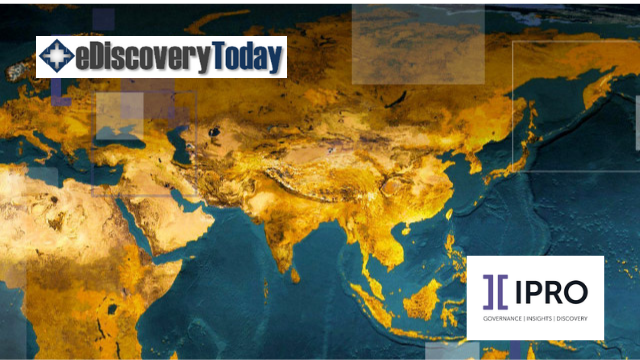
Doug Austin, editor of eDiscovery Today, reviewed The Primer on eDiscovery in the Asia Pacific (APAC) Region 2021 published by EDRM for the IPRO blog. The project was lead by Susan Bennett, Project Trustee.
According to Doug Austin:
One of the areas of the world for which we now have a terrific resource to help us understand how eDiscovery is conducted is the Asia Pacific (APAC). EDRM recently published an APAC Primer for eDiscovery (available for download here) that goes into depth for the region, discussing each of nine countries/jurisdictions in depth in terms of its judicial system, its discovery requirements and guiding principles, and its handling of eDiscovery (among other things).
Doug Austin
While some countries/jurisdictions (Australia, New Zealand, Hong Kong and Singapore) have common law systems and well-established eDiscovery practices and procedures in their respective court rules, other countries have different legal systems and less established eDiscovery practices.
Doug Austin took a brief look at each country/jurisdiction’s material and what they have in place from a rules and discovery standpoint:
- Australia (Common Law): Court Rules, Practice Notes including Document Exchange Protocols for Discovery in Federal Courts and State Courts. Australia has established discovery practices and courts closely monitor discovery in litigation.
- Mainland China (Similar to Civil Law): Civil procedural rules provide for very limited scope for evidence collection and preservation and production procedures when compared with common law discovery regimes. Judges primarily direct these processes.
- Hong Kong (Common Law): Hong Kong has established discovery practices and protects legal professional privilege following the English legal tradition. Its courts provide for civil procedural rules and practice directions, including document exchange and eDiscovery protocols.
- India (Combination of Common Law, Civil Law and Religious Law): The IT Act defines rules to carry out electronic evidence collection or proceedings.
- Japan (Civil Law): Japanese civil procedural rules provide for very limited scope for evidence collection and preservation and production procedures when compared with common law discovery regimes. Judges primarily direct these processes.
- Korea (Civil Law): No common law discovery rule exists. Civil proceedings in Korea are governed by the Korean Civil Procedure Act (KCPA). Courts and judges are the primary fact finders in the evidentiary process.
- Malaysia (Common Law): There are no specific provisions for eDiscovery. The Rules of Court (ROC) are based on the English civil procedure rules, which provide for discovery, document exchange, and interrogatories. These can be applied to eDiscovery.
- New Zealand (Common Law): Court Rules include Document Exchange Protocols for discovery. New Zealand has established discovery practices and courts monitor closely discovery in litigation.
- Singapore (Common Law): The Rules of Court which are based on the English civil procedure rules, provide for discovery, document exchange, and interrogatories. In addition, Practice Directions (PD3, Part IV(A)), provide guidance specifically for eDiscovery.
EDRM thanks Doug Austin and IPRO for the coverage. EDRM is very grateful to our project team and to The Sedona Conference for sparking this project. The project team, lead by Susan Bennett includes:
- Australia: Maureen Duffy
- China: Jared T. Nelson, Tom S. Groom
- India: Sandeep Jadav
- Japan: Sebastian Ko, Daryl Osuch
- Hong Kong: Sebastian Ko
- Korea: David Kang
- Malaysia: Gita Radhakrishna
- New Zealand: Maureen Duffy, Andrew King
- Singapore: Gita Radhakrishna


